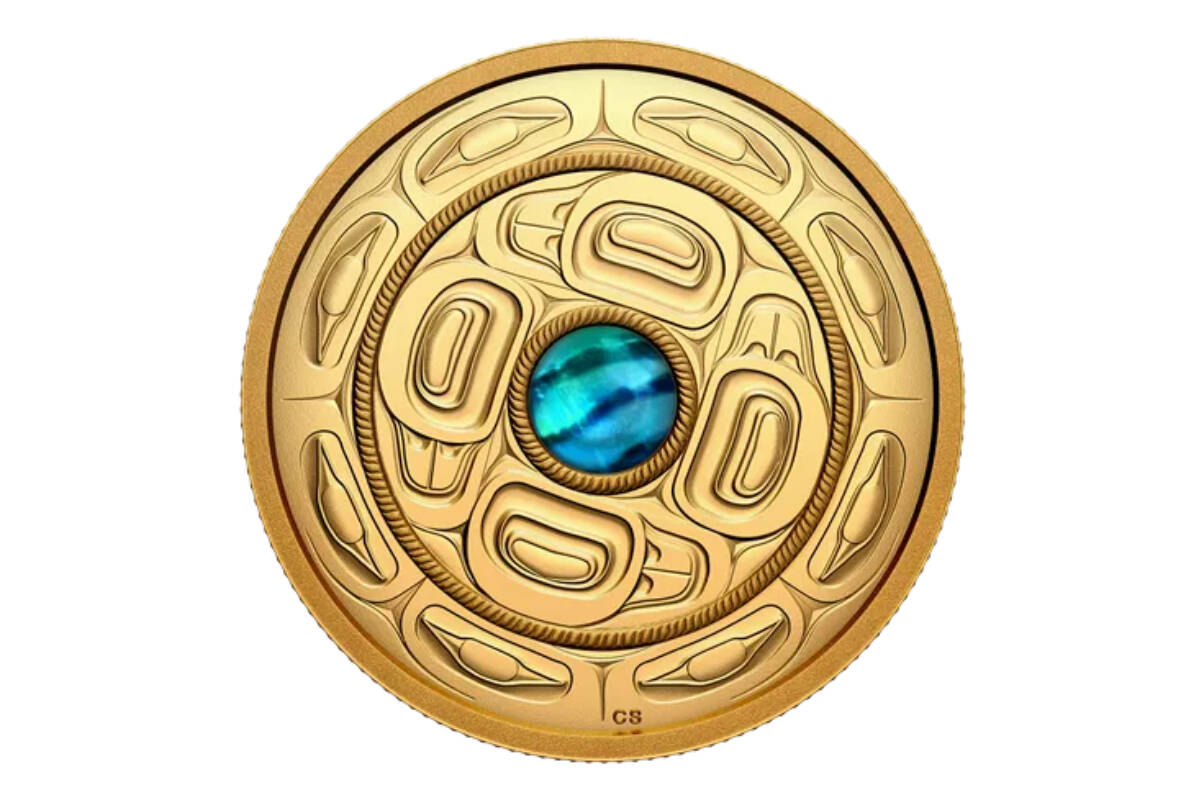Haida artist Yahl ‘Aadas’ (Cori Savard’s) design is featured on a 2023 $200 gold coin for the Royal Canadian Mint’s (RCM) Celebrating Canada’s Diversity series, which launched Jan. 10.
Only 275 coins were created. So, while its face value is $200, it is a collector’s item and costs $4,199.95 to purchase.
Yahl ‘Aadas was contacted by the RCM, along with several other artists to submit concept drawings for the project, she said.
“It’s surreal. It’s a big moment in my career. I’m incredibly proud to be able to create something that represents the Haida Nation.”
It was a surprise for her friends and family because she had to keep details of the project quite.
“Their reactions have been positive,” she said.
This is the fourth coin in the Celebrating Canada’s Diversity series and pays homage to traditional knowledge of the Haida as well as a guiding principle to the Haida worldview — the interconnectedness of all living things.
“Haida have lived through thousands of years of changing landscapes. We have been people of the tundra, people of the ice. For over 10,000 years, we have been ocean people. No matter our environment, we have always been Haida,” Jisgang Nika Collison, executive director at the Haida Gwaii Museum, stated.
“This masterful coin pays great respect to our homeland, values and lifeways of yesterday and today. It pays homage to our Elders, children and future generations. It is a precious reminder of our inextricable relationship with, and responsibility to, our home and each other. And, it’s gorgeous!”
Each of the previous three coins in the series features a gem in the centre, including one with a Madagascar ruby and another with an emerald. Yahl ‘Aadas’ design also features a special centre, a nod to the ocean.
“The abalone shell was the clear choice for the inlay as it is traditionally used to adorn Haida art; it also added to the theme of interconnection, by representing our ties to the ocean that surrounds Haida Gwaii,” Yahl ‘Aadas stated.
Abalone shell comes from a mollusk that is a traditional food for Haida. Abalone would have been harvested using a kíit’úu, which is a two-pronged spear with sharpened branches connected to a cedar pole, the RCM website states.
Surrounding the shell centrepiece are two rings of formline design.
The outer ring was made to represent the eyes of Haida Elders and knowledge holders who watch over the younger generation, represented by the inner ring.
Yahl ‘Aadas had only a couple of weeks to develop the concept for the design but once it was selected she had some time to refine it. She said it took a couple of attempts to get it right.
“Although circular designs are common within Haida art, repetitive patterns are not. The challenge for me was to create a pattern using formline that would represent the Haida Nation, without depicting any crests that belong to any one clan —this way, everyone is included.”
The two rings of formline are separated by a rope design.
“The repetitive patterns flow into one another, as knowledge is passed down from one generation to the next, while the intertwined cedar rope further reinforces this notion of interconnection—of generations, of land and sea,” the RCM website states.
Cedar plays an important role in Haida culture and beliefs, the website goes on to explain, from hats and clothing to tools, baskets, canoes, longhouses and more.
While 275 coins were created, each one is actually one-of-a-kind since no two abalone shells are the same.
MORE NEWS: Haida Gwaii man breaks world record for oldest male to do headstand
Kaitlyn Bailey | Local Journalism Initiative Reporter
Send Kaitlyn email
Send The Observer email
Like the The Northern View on Facebook
Follow us on Twitter

